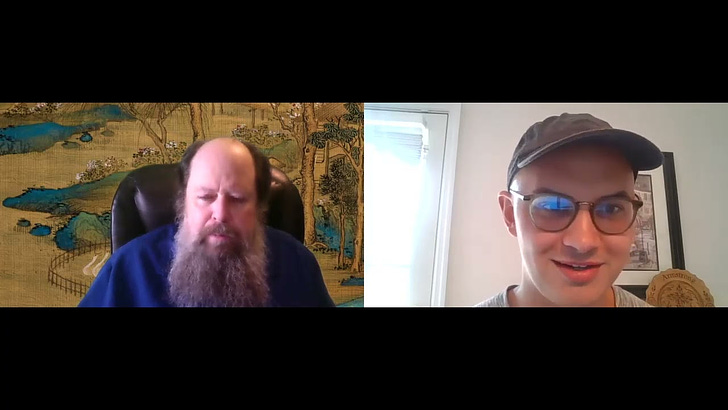David Armstrong used to write a delightful Substack newsletter called A Perennial Digression, for which he also recorded several interviews. He has, for various reasons—mostly having to do with time—ceased writing and recording for the publication. The contents are still available online (somewhere), and he has kindly provided me copies of the four interviews he recorded with me, which I am in the process of posting (at intervals) on the YouTube annex of Leaves in the Wind. Two of those conversations already appear as links in this newsletter (“To Dwell in Evanescence” on 20 January 2022 and “The Imaginal and the Poetic” on 7 June 2022). This conversation, however, is appearing here for the first time, and seems especially relevant to the topics of my post from a day ago. Mind you, the discussion goes in many other directions as well, taking in such matters as Buddhist and Vedantic metaphysics, Indo-Chinese religion, Asian literature, divine monkeys, Catullus, Latin pronunciation, and so forth.
Discussion about this post
No posts




When David (A.) mentions at the beginning, that mastery in (mostly protestant) ministry of deconstructing text into something approximating its opposite meaning, and the subsequent reference to the first beatitude a little later, I was reminded of a classic example from William Barclay's Matthew commentary. In spite of expanding upon the significance of the term 'ptóchos', a rather convenient distillate at the end of the commentary states:
"So, the first beatitude means: O the bliss of those who have realised their own utter helplessness, and who have put their whole trust in God, for...".
Whatever the original, intended meaning was, any wee form of "rabble rousing" is duly extinguished. Rather helpful of course in refocussing efforts on that modus vivendi with the "well heeled" members.
Etienne Gilson, on the political stomping grounds of one Réginald Garrigou-Lagrange, O.P., aka The Sacred Monster of Thomism:
"...Posterity will have more leisure than we have, and the future will see things from a distance that is lacking to us. Those who are curious about doctrinal teratology will enjoy unraveling the intricacies of such an alliance. On the political level no explanation is needed. The French people are born fanatics; rightists or leftists, they are always willing to persecute one another in the name of some sacred principle. ....The really interesting question was to know why a Master in Theology belonging to the Order of Saint Dominic, as well as a highly qualified interpreter of Thomism who enjoyed in the Church an unchallenged doctrinal authority, should then have felt duty bound to teach that Charles Maurras and Saint Thomas Aquinas agreed on the notion of "the best political regime."
It is enough to open the Summa Theologiae at the right place to know that this is not true. Yet this theologian was very far from being alone in his error. Laymen of great intelligence and talent did not hesitate to side quite openly with the "party of order". The heart of the problem would be to know how, by what secret channels, Thomism could seem to them to offer a theological justification of the political theory of Charles Maurras. What the royalists hoped to gain from such an alliance is obvious. Saint Thomas is the Common Doctor of the Church. To establish that his political doctrine was the same as that of Charles Maurras amounted to proving that the political doctrine of Charles Maurras was that of the Church. With this proved, all French Catholics without exception would have been held in conscience to accept the monarchist politics of the Action Francaise. What a haul! Let us resist the temptation to ask what peculiar brand of "Thomism" this must have been to feel akin to the positivism of Maurras which, like that of Comte, was deeply interested in Rome but not in Jerusalem."
–The Philosopher and Theology